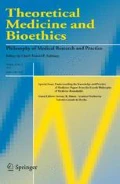Abstract
The principle of individual medical confidentiality is one of the moral principles that Africa inherited unquestioningly from the West as part of Western medicine. The HIV/AIDS pandemic in Southern Africa has reduced the relevance of the principle of individual medical confidentiality. Individual medical confidentiality has especially presented challenges for practitioners among the Bantu communities that are well known for their social inter-connectedness and the way they value their extended family relations. Individual confidentiality has raised several unforeseen problems for persons living with HIV/AIDS, ranging from stigma and isolation to feelings of dejection as it drives them away from their families as a way of trying to keep information about their conditions confidential. The involvement of family members in treatment decisions is in line with the philosophy of Ubuntu and serves to respect patients’ and families’ autonomy while at the same time benefiting the individual patient.
Similar content being viewed by others
References
Ensor, J.C. 1988. Doctor-patient confidentiality versus duty to warn in the context of AIDS patients and their partners. Maryland Law Review 47: 675–700.
North, R.L., and K.H. Rothenberg. 1993. Partner notification and the threat of domestic violence against women with HIV infection. The New England Journal of Medicine 329: 1194–1196.
Crepaz, N., and G. Marks. 2003. Serostatus disclosure, sexual communication and safer sex in HIV-positive men. AIDS Care 15 (3): 379–387.
Boyd, K. 1992. HIV infection and AIDS: The ethics of medical confidentiality. Journal of Medical Ethics 18: 173–179.
Bayer, R., and K.E. Toomey. 1993. HIV prevention and the two faces of partner notification. American Journal of Public Health 82: 1158–1164.
Mbiti, J. 1970. African religions and philosophy. New York: Doubleday.
Gbadegesin, S. 1991. African philosophy. New York: Peter Lang.
Tempels, P. 1959. Bantu Philosophy, trans. C. King. Paris: Présence Africaine.
Samkange, S., and T.M. Samkange. 1980. Hunhuism or Ubuntuism: A Zimbabwean indigenous political philosophy. Harare: Graham.
Khoza, R. 1994. African humanism. Ekhaya Promotions: Diepkloof Extension SA.
Beauchamp, T.L., and J.F. Childress. 1994. Principles of biomedical ethics, 4th ed. New York: Oxford University Press.
Gordon, D. 1988. Tenacious assumptions in Western medicine. In Biomedicine examined, eds. Margaret Lock and Deborah Gordon, 19–56. Dordrecht, Netherlands: Kluwer Academic Publishers.
Shweder, R.A., and E.J. Bourne. 1982. Does the concept of the person vary cross culturally? In Cultural conceptions of mental health and therapy, eds. A.J. Marsella, and G.M. White, 97–137. Dordrecht, Holland: D. Reidel Publishing Co.
Lukes, S. 1990. Individualism, 4th ed. Cambridge: Basil Blackwell.
Garrett, T.A., H.W. Bailey, and R.M. Garrett. 1989. Health care ethics: Principles and problems. Englewood Cliffs, New Jersey: Prentice Hall.
Edwards, R.B. 1988. Confidentiality and the professions. In Bioethics, eds. R.B. Edwards, and C.G. Graber, 74–77. Washington: Harcourt Brace Javanovitch.
Andre J. 1986. Privacy as a value and as a right. The Journal of Value Enquiry 20: 309–317.
Venter, E. 2004. The notion of Ubuntu and communalism in African educational discourse. Studies in Philosophy and Education 23 (2–3): 149–160.
Kenyatta, J. 1965. Facing Mount Kenya. New York: Vintage.
Lane, S. 1993. Learning from Africa. Cincinnati: Forward Movement.
Tangwa, G. 2000. The traditional African perception of a person: Some implications for bioethics. Hastings Center Report 30 (5): 39–43.
Ijsselmeiden, C.B., and R. Faden. 1992. Research and informed consent in Africa—another look. The New England Journal of Medicine 326 (12): 830–833.
Fink, H.E. 1989. Religion, disease and healing in Ghana. Munchen: Trickster Wissenschaft.
Lambo, A.T. 1969. Traditional African cultures and western medicine: A critical review: Medicine and culture. In Proceedings of a historical symposium organised by the Wellcome Institute of the History of Medicine, London, and the Werner-Gren Foundation for Anthropological Research, New York, ed. F. Poynter, 89–101. Crewe: Frank Cotterell Ltd.
Ogden, J., and L. Nyblade. 2005. Common at its core: HIV-related stigma across contexts. Washington, DC: International Center for Research on Women (ICRW).
Kirungi, F. 2005. Uganda beating back AIDS, leadership, education and openness are keys to progress; Silence no more, Africa fights Aids, Africa renewal. New York: U.N. Department of Public Information.
Matovu, J., et al. 2002. The Rakai Project Counseling Programme experiences. Tropical Medicine and International Health 7 (12): 1064–1067.
World Health Organisation (WHO). Antiretroviral therapy for HIV infection in adults and adolescents: Recommendations for a public health approach. http://www.who.int/hiv/pub/guidelines/adult/en/index.html. Accessed June 3 2008.
Author information
Authors and Affiliations
Corresponding author
Rights and permissions
About this article
Cite this article
Ndebele, P., Mfutso-Bengo, J. & Masiye, F. HIV/AIDS reduces the relevance of the principle of individual medical confidentiality among the Bantu people of Southern Africa. Theor Med Bioeth 29, 331–340 (2008). https://doi.org/10.1007/s11017-008-9084-y
Published:
Issue Date:
DOI: https://doi.org/10.1007/s11017-008-9084-y




